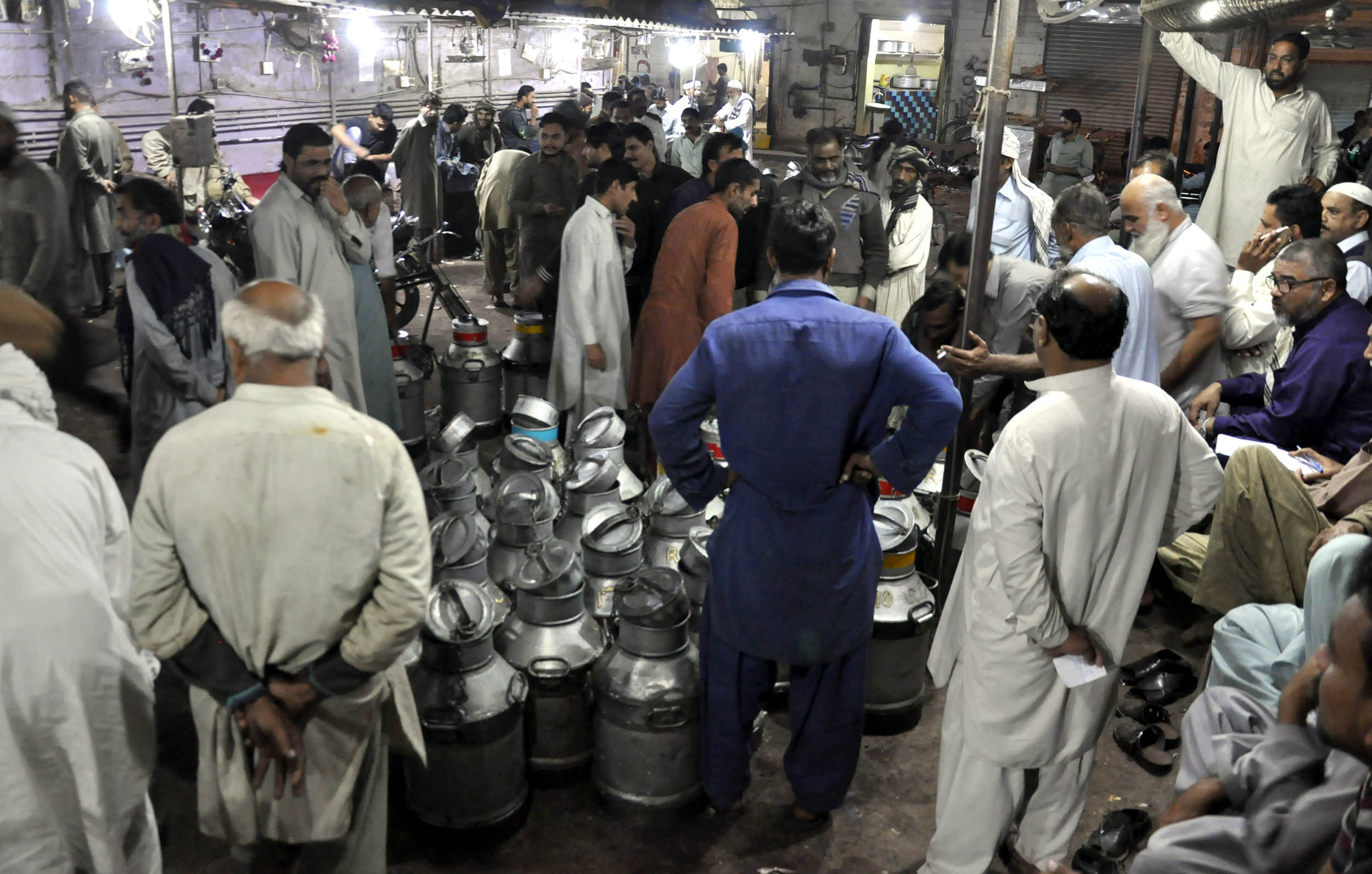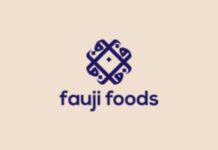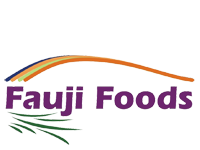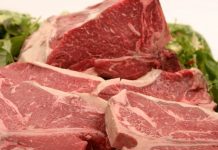On a Wednesday evening in one of Karachi’s oldest areas, Lea Market, Samir Rajput is working the phone, trying to seal a deal with his clients before 8 p.m., the starting time of the Mandi – one of the mega city’s main wholesale markets for unbranded, loose milk. He goes through this rigmarole twice a day to settle the days’ wholesale price with retailers.
Sporting a French beard and clad in blue jeans, Rajput, who has been working with his father for the past 30 years, dips his bare hands in the steel container to ascertain the milk’s quality – the conventional ways of the market. Juxtaposed against the state-of-the-art 30 lab tests from farm to factory to check if the produce is fit for human consumption by the corporate sector – the likes of Engro Foods and Nestle Pakistan – this seems primitive.
Once Rajput approves the quality, the milk makes it to the retailers where it’s sifted with muslin to make sure the flies, insects or other similar deposits are filtered before it is poured into chillers, ready to consumers to buy and consume.
About 12 kilometers south, on the coast of Arabian sea, stands The Harbour Front, a modern triangular tower that is home to leading local and multinational corporations. On the fifth floor of this 19-storey building, the new management of Engro Foods is left scratching their heads as loose milk suppliers continue to defy the company’s core strategy: educating consumers about hazards of unhygienic loose milk, and in the process, converting them to packaged milk.
With an objective to make formal sector increase its share from a dismal 6% of the market to 30% by 2030, the two largest players Engro Foods and Nestle Pakistan spent Rs17 billion in the first nine months of 2017 on marketing and distribution of their products, but that wasn’t enough to convert more consumers to branded dairy products. In other words, the advertising dollars meant to create awareness about the packaged milk and its unbranded rivals apparently fell on deaf ears and unseeing eyes.
“When we boil milk bought from the dairy, a thick cream surfaces, which does not happen with the Tetra Pak [packaged UHT] milk from the shop. Tea and other things made with packaged milk do not taste the same,” said Samina Durrani, a resident of North Karachi, explaining why she prefers loose milk from a nearby dairy farm.
More commonly known as Barrah, the dairy farms, which cater to consumers like Durrani, are mostly situated in Karachi’s outskirts Sohrab Goth, Bhains [Cattle] Colony and on Super Highway (M2). They operate under terrible hygiene conditions, but these farm owners have their own justifications for that.

Thriving, despite poor hygiene:
“We need water to maintain hygiene. In Karachi even humans don’t get clean water to drink, how can we assure hygiene for cattle,” says Liaquat Mastoi, who owns a dairy farm in the Cattle Colony – home to 1,500 dairy farms, producing 4 million litres a day, easily the largest supplier of fresh milk to port city.
Despite poor hygiene, the loose milk market thrives, and keeps on growing at a significant scale. There is no public data to measure the size and growth of Karachi’s unbranded milk market, but industry sources estimate that the city consumes 5.5 million liters a day, which is almost entirely supplied by the traditional, unstructured loose milk retailers, otherwise criticized for their primitive supply chain.
The above estimate is about two years old, while the market is said to have expanded significantly since. The overall consumer expenditure in the country grew by 8% between 2015 and 2016, according to a report by Euromonitor. And fresh milk constitutes 6 to 7% of the consumer basket, a set of common goods and services purchased by households on a daily basis every month.
A field survey of populated neighborhoods like North Karachi, Gulshan e Iqbal, Gulistan e Jauhar, Orangi Town, and Korangi indicates an increase in the business of loose or unbranded milk as several new shops have opened up in these areas. Take for example Bhittai Colony Sector B, off the busy Korangi Crossing bus stop. At least 10 new milk shops alone have opened up here within a range of only 150 meters in the last one-and-a-half years.
What went wrong at Engro Foods
Though it is the biggest brand from formal sector in Karachi, Engro’s signature UHT milk Olper’s has a less than 5% share in the city because of a drop in volumes in the last 18 months, according to market analysts. The company is losing consumers back to the undocumented sector not only in Karachi but also in other parts of the country, multiple sources confirmed to Profit – though it was evident from the company’s financial data.
Just before its acquisition in 2016 by the Dutch dairy giant Frieslandcampina, Engro Foods had reported its highest-ever quarterly earnings. However, the company is in hot waters since the takeover, reporting losses in two of the last four quarters for which data is available.

In the first nine months of 2017, Engro’s net profit dropped by 85% to Rs385.7 million, a far cry from Rs2.6 billion of the corresponding period of last year. On the other hand, sales for the period decreased by a fifth to Rs27 billion. Little wonder then, what used to be one of investors’ most beloved stocks lost almost 60% of its value last year – Engro Foods share was trading at Rs80.3 on the last trading session of the year, down from Rs191.7, its price on January 2, 2017.
To add insult to injury, the government policies over the past couple of years, and ‘negative perception’ that stem from media coverage of a Supreme Court case and Punjab Food Authority’s campaign against packaged milk, and tea whitener factor turned out to be too much to handle for Engro Foods’ new management, putting its leadership to test.
In this report, Profit takes a look at what went wrong at Engro Foods, how the new management plans to fix it and whether it can do it anytime soon.
The struggle against loose milk
From day one, Engro Foods has remained focussed on tapping into the loose milk market, and the new management doesn’t seem to have changed that strategy either.
“Our long term objective is to drive the conversion from loose milk,” the company said in an email to Profit. Reaffirming its policy stance, it said, “Engro Foods is focusing on various initiatives centered on rebranding the image of packaged milk as well as educating consumers about the hygiene and quality standards prevalent within the packaged industry relative to adulterated, unhygienic loose milk.”
However, in its little over 10-years in the business, the company’s struggle against loose milk is now even more pronounced than the competition from formal sector, where it was a clear leader with 56% share in the UHT (Tetra Pak) segment as recently as 2016.
Take Mabrook for example, a pilot project the company launched in late 2013 to take the bull by the horns. The company took the battle to home turf of its unbranded rival by entering the retail market itself through franchise model. Cream or high fat content being the selling point of unbranded milk, Mabrook was launched with the slogan ‘balai bhar doodh’ (high fat milk). Engro Foods’ bet was to hygienically dispense pasteurised milk and create the feel of loose milk to lure consumers away from traditional milk sellers. It had even set aside a whopping Rs460 million for marketing, promotion and subsidies (to the franchisees), but the idea didn’t click and the company had to wind up that project in a year – having spent half the budget by then.
According to both the company and analysts, the model was unviable economically since even successful franchises were complaining about low return on investment and high operational costs. Though Engro was the most aggressive about conversion from loose milk, the whole formal sector has put hygiene at the front of their marketing campaigns. For example, Nestle Pakistan ran a big marketing campaign on television under the ‘Safe Milk’ banner, without hardly making a difference to the overall equation.
It took formal sector almost 10 years to nearly double their share from a paltry 3.5% in 2006 to 6% in 2016. Since then it has at best remained stagnant, and by some accounts seen a drop. In the same period, the market size increased from 33 billion liters to 54 billion liters a year or 11.3% share of the GDP as per Economic Survey of Pakistan 2015-2016.
A 2006 paper penned by Engro Foods founding CEO, Sarfaraz Rehman, had estimated that the packaged milk industry would reach 40% of the total milk market by 2015. But far from meeting the forecast, the branded milk industry’s share has not even reached a tenth of the market – a clear indication that the informal sector fully cashed in on this market expansion.
Engro hit the hardest
Market analysts, industry experts and even executives from dairy sector Profit spoke to agree that the industry has lost some share back to the loose milk suppliers during last one-and-a-half years, the focus period for this report. This was primarily because of regressive government policies and negative perception among the people.
In 2016, Pakistan Council of Scientific and Industrial Research (PCSIR) conducted lab tests of 16 UHT milk brands and found that only six of them were fit for consumption. It was later submitted to Supreme Court – hearing a petition by Barrister Zafarullah Khan against quality of milk sold in the country. But the damage was done by the manner of media’s coverage of the case, resulting loss in consumer confidence in the packaged milk, and a drop in the industry’s volumes.
It dealt a fresh blow to the sector, already reeling from being moved to tax-exempt from zero-rating regime only recently. The change in tax policy meant the industry could no more claim refunds on value-added tax paid on inputs. That is the sales tax paid by dairy companies on import of raw material like powdered milk had to become part of the cost. At present the government owes dairy sector about Rs15 billion in refund claims, of which Engro Foods’ share is around Rs2 billion (as of Sept 30, 2017). Making already a bad situation worse, the government imposed another 25% duty on import of skimmed powdered milk, raising input costs by 8%.
If removing the sector from zero-rating wasn’t enough, the national exchequer served notices to the producers of tea whiteners asking them to pay taxes on these products for the entire period since their launch because they were not tax exempt anymore. For example, Fauji Foods received a sales tax order, dated May 26, from Inland Revenue for payment of Rs974 million for sales tax along with default surcharge and penalty of Rs225 million due to alleged non-payment of sales tax on “Chai Mix, Dairy Rozana and Dostea (tea whitener)” – on the grounds that zero rating or exemption is available to dairy products only, not the tea whitener.

Industry sources say all companies received that notice including Engro. Fauji Foods says it has filed an appeal with Inland Revenue, and since it expected a favorable outcome, it didn’t create any provision for that. The other players expressed similar views, maintaining the order doesn’t make sense and instead of paying up, they would rather challenge it. The flip side is, if tax on tea whiteners for the last 10 years is to be paid, Engro Foods may have to dish out around Rs10 billion.
These policies combined with negative reporting sent the overall industry volumes scurrying down 40% during the last 18 months, according to an official familiar with the matter. Again the company hit the hardest was Engro Foods.
A glance at the financial statements of Engro Foods, Fauji Foods and Nestle Pakistan shows that Engro Foods was the only listed company that saw a decline in its volume during the period under review.
Since the change in management, the company has stopped giving analysts briefings and investor presentations about its business, but sources familiar with the matter told Profit that Olper’s volumes were down 15% to 1.2 million liters in the last fiscal year against 1.4 million liters in the corresponding period. Tarang, the tea whitener, received some serious hammering, going down from 970,000 liters to 400,000 liters, a drop of more than 50%.
“Engro got the hit by virtue of being the largest player in UHT segment,” said an industry expert on conditions of anonymity, with multiple sources endorsing his view.
More than 90% of the company’s revenue come from UHT segment. According to an analyst, Tarang was 50% of all UHT sales followed by Olper’s (40%) and Omang (7-8%) at the end of 2016. Since its two main products, Olper’s and Tarang, got clobbered, Engro found itself pushed against the ropes. Despite MilkPak running neck to neck with Olper’s, Nestle didn’t suffer to the same extent because UHT accounts for less than a fifth of its revenues, and it is not dependent on it as such.
Expansion, not a priority
“The company is in consolidation phase. So putting the house in order seems to be the priority, not expansion,” said an analyst, adding, since it has become an MNC, this is usually how they operate – settling down first and then expanding.
Other sources are getting similar impressions from some of the company’s recent moves. “FrieslandCampina has even reduced collection centres,” said the expert, adding the company might be relying more on powdered milk as it became cheaper than locally procured milk because of a notable drop in international prices. According to industry insiders, both Engro Foods and Nestle mostly procure milk from local farmers and rely on imported milk powder only in summers to make up for the seasonal shortfall.
“When a new company comes, the market grows but the new player also eats into someone’s share and it is usually the largest player that gets hit,” the analyst said. For example, he said there are many brands that have set up dairy farms and catering to their surrounding areas. Jahangir Tarin dairy, which is located near Sadiqabad on the border of Sindh and Punjab is one example, for it is catering to four to five cities in close vicinity.
Overall dairy sector growth declined due to negative perception created in the media about packaged milk and efforts by Punjab Food Authority on certain labeling requirements related to tea whiteners, Fauji Foods said in a report. Talking about the PFA episode, CEO of a dairy company said as per PCSIR’s findings, heavy metals were found in UHT samples. These heavy metals were actually iron and zinc which are naturally present in the milk and were well within the limits as per international standards, but media coverage failed to highlight that. Later on even SC agreed to it, he said.
Analysts and experts we spoke to say the PFA episode became too much to handle for Engro Foods. Tarang suffered the most because of PFA’s campaign which targeted tea whiteners, said the expert. However, he added Tarang also ran into some quality issues for the first time since its launch and the timing was cruel. “There were complaints about the liquid whitener getting spoiled quite often,” he said.
Besides, media coverage, increase in duties also dented the segment. All tea whiteners use skimmed powdered milk. Therefore, the import duties hit them hard as prices increased, resulting in consumers to switch to cheaper brands or loose milk, said an analyst. Dominated by Tarang for almost a decade, the tea whitener segment has seen increased competition after two big brands, Dostea of Fauji Foods and CupShup of Dalda Foods, entered the market recently and Nestle also aggressively marketed EveryDay. Though all brands were affected, being top of the totem pole, Tarang suffered the most.
Misconceptions about the UHT
Fauji Foods report says, the industry is recovering from the negative media campaign against packaged milk and tea whitener and is expected to grow in the period ahead.
“There are misconceptions about UHT technology in Pakistan. Majority of Europe is on UHT,” CEO of a dairy company said, giving examples of France, Spain and Germany where UHT is 96% (in the first two), and 60% in the third because it offers convenience. “Even in India, packaged industry has 40% share,” said he.
Experts are of the opinion that eventually the entire milk market will be converted to packaged industry as is the case everywhere in the world. Media speculation and rumours about the quality of UHT milk will die down, they say, but the real threat that still persists is the market for loose milk. In such an environment, regressive policies only hurt industry’s efforts for conversion.
“The imposition of regulatory duty and the change in sales tax regime on dairy products has increased cost pressures on the processed industry. The impact of these changes has not been fully passed onto the consumer, putting pressure on the company’s margins,” said Engro Foods responding to a question – the company’s gross margin declined from 25.4% to 17.1% during the nine-months ending September 2017.
The company says the undocumented and untaxed loose milk sector has created an uneven playing field for the processed industry – Engro Foods and Nestle Pakistan collectively paid Rs6 billion in corporate tax for 2016 as opposed to none paid by undocumented sector. “Current Company efforts are targeted towards driving loose milk conversion to fuel category growth while employing other tactical measures to gain market share,” it said.
The company admitted its sales were affected by the widening gap with loose milk and a widening pricing differential between loose and processed milk has also hurt conversion in the recent past.
The higher price differential with loose milk meant that price sensitive consumers switched back to the latter – loose milk was selling at Rs80 per kilogram and Olper’s at Rs95 per liter two years ago; currently the rates are Rs85 and Rs130.
The documented sector has to pass on the impact of increased costs to consumers because they can’t compromise on quality. The unbranded milk suppliers on the other hand have various ways to deal with any rise in input costs.

According to a survey by Profit, to retailers a liter of milk with 4% fat level costs Rs60, and with 7% fat level Rs80. This doesn’t include the labor and transportation expenses that further jack up overall costs of procurement. As a result, they resort to different methods to maximize their profits. For example, water is mixed in the milk to increase its quantity, corn flour is added to thicken the consistency, and ice – 8 litres for every 40 litres of milk – and caustic soda are used to increase the shelf life of this highly perishable commodity.
“Often one liter costs us more than 80 rupees. If we don’t do these things, how will we be able to sustain the business,” a loose milk retailer told our correspondent.
In a dairy convention at the Karachi Press Club in 2016, dairy farmers protested against the formal sector and demanded price regulation. They even questioned the corporate sector for selling “branded milk powder with chemicals that could cause health concerns”, without specifying, which chemicals were added. Even if coincidently, their calls were answered after UHT producers were taken on by the PFA. The formal sector demands, however, may not achieve similar results.
A delegation of Pakistan Dairy Association, an association of branded dairy milk producers, called on Prime Minister Shahid Khaqan Abbasi in Islamabad last December and made some recommendations. These include, introduction of minimum pasteurization law at the federal level, harmonizing foods standards at national level, reinstatement of zero-rating regime, and removal of regulatory duty on skimmed milk powder.
Profit’s queries to the government were not responded to till the filing of this report, but an FBR official confirmed that the incumbent is in no mood to make any changes in the current tax regime.
Engro remains optimistic
That said, Engro Foods is still optimistic about achieving higher conversion rates. “It is possible to achieve this target and even beyond, given a level playing field coupled with efforts from all the players in the organized dairy sector,” said the company responding to a question if the formal sector can still reach 30% of the market by 2030. “We believe that the implementation of the minimum pasteurization law is under consideration by the government. This is an initiative that has clear and immediate impact on the health of the future generations,” said the company spokesman.
Responding to another question, the company said it would increase its product range. “RFC has a wide and diverse product portfolio and the company will introduce those best fit for the Pakistani market.”
The company refused to comment on the statistics about Tarang and Olper’s that we shared with them, nor did it specify a timeline for completion of the consolidation phase. “We see a huge opportunity in the Pakistani dairy market. Friesland has a long term view on Pakistan, which is why they have made a significant investment in Engro Foods,” it said.

Though optimistic about its long-term growth prospects, Engro Foods said the key objective is to drive conversion from loose milk to safe packaged milk as well as increase the product range offered to consumers. However, one of the analysts surveyed by Profit said, if their margins didn’t improve and things were not fixed he sees them reporting a loss of Rs0.15 per share in the last quarter of 2017.
-With additional input from Aisha Arshad








Once upon a time, a Japanese was walking down in Some Pakistani city centre. All of a sudden he saw a board on a dairy shop written PURE MILK IS AVAILABLE OVER HERE, He was astonished to see this narrative and asked his fellow that is there impure milk exist in Pakistan because this was beyond his imagination. To his innocence he was told that over 90% of the say over 50 billion litres of Pakistani milk sold every year is impure one.
As far above mentioned article is concerned, the crux of the problem is that The prevailing retail prices of packaged milk is beyond the affordability of say 90 % of 200 million Pakistani consumers. In the developed countries, agriculture, particularly dairy and livestock are subsidized, not to speak of levieing taxes and duties on such products. In the UK market pure pasturized milk is available 2 litres for one pound and certain hours it is 4 litres in one pound. How do they do? is some thing to ponder over. m.aslam ch
The problem with Engro which I felt is that their products are mostly not available normally in any big superstore such as Hyperstar etc. Whenever I want to buy their flour (Onaaj) or Milk (Olper), it is out of stock and then since last few months, it is not coming at all in major stores. Engro has to realize that the market that they target normally shops from supermarkets so it is sheer negligence that why their products are not available there whereas the alternates (Milkpak etc) are always available. I have searched Onaaj in many stores but still can’t get hold of it even though I found it one of the best flour brand.
instead of improving loose milk market, why we need to convert share of ordinary milkman to few corporate east india company
Comments are closed.